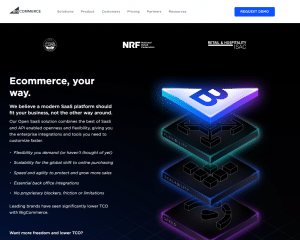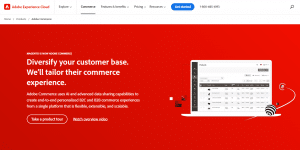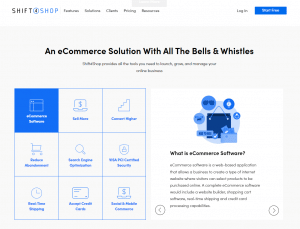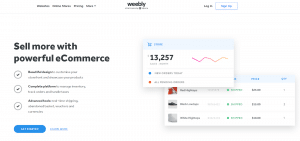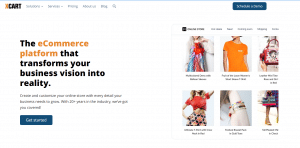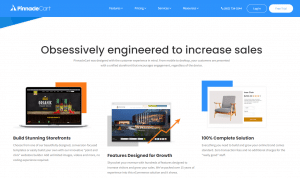9 Shopify Alternatives for 2025
A Comprehensive Comparison of E-Commerce Platforms

If you're thinking of starting an e-commerce business, you've probably heard of Shopify. It's a popular platform that powers over a million online stores worldwide. However, Shopify isn't the only option out there.
In this article, we'll take a closer look at some of the top Shopify competitors and compare their prices and features, including free Shopify alternatives we can recommend. Whether you're just starting out or looking to switch platforms, this guide will help you make an informed decision.
Top Shopify Alternatives in the market
#1. WooCommerce
WooCommerce is one of the most prominent Shopify alternatives out there. It’s a popular open-source e-commerce platform that runs on WordPress.
The platform offers a wide range of features, including customizable themes, payment gateways, and shipping options. However, it requires some technical know-how to set up and maintain, and you'll need to install plugins to get certain features.
Pricing: WooCommerce is free, but you'll need to pay for web hosting and a domain name. Hosting costs can vary widely depending on your needs, but you can expect to pay anywhere from $5 to $50 per month.
Pros
- Enjoy zero transaction fees when you use this platform.
- Seamlessly integrate with WordPress for an enhanced user experience.
- You'll be able to leverage a variety of features that foster maximum creativity.
- Increase your sales with the convenient post-purchase one-click upsell option.
- Easily set up your store with minimal hassle.
- You'll have the freedom to sell an unlimited number of products in your store.
- Get access to a vast selection of premium and free extensions.
Cons
- No hosting is included with the platform.
- Technical skills are required to utilize this tool.
- The platform can be a little clunky at times.
- Slow hosting can be a hindrance. Consider using a dedicated WooCommerce host to ensure fast speeds.
#2. BigCommerce
BigCommerce is a cloud-based e-commerce platform that offers a wide range of features, including customizable themes, payment gateways, and shipping options. It's known for its scalability, making it a good choice for businesses that expect to grow rapidly.
However, it can be more expensive than other platforms, and it requires some technical know-how to set up and maintain.
Pricing: BigCommerce offers several pricing plans, starting at $29.95 per month for the Standard plan and going up to $299.95 per month for the Pro plan.
Pros
- Build your stunning ecommerce store with ease using the platform's multiple drag-and-drop visual editing tools.
- Enjoy the convenience of more than 55 secure payment gateways and zero transaction fees.
- Sell across multiple channels with ease.
- Access a variety of free apps and features, including the in-app checkout feature for Instagram.
- Fully customize your URLs and take advantage of the SEO function to increase your visibility online.
- The platform is versatile and suitable for different business models.
Cons
- The pricing can be a bit complex to understand for new users.
- The initial setup process can be a little challenging.
- Only five free themes are available to choose from.
- The platform's speeds can be inconsistent at times.
#3. Adobe Commerce (Magento)
Formerly called Magento, Adobe Commerce is an open-source e-commerce platform that's popular among larger businesses. It's known for its scalability and flexibility, offering a wide range of features and customization options. However, it requires a higher level of technical know-how to set up and maintain, and it can be more expensive than some other platforms.
Pricing: Adobe Commerce (Magento) offers a free Community Edition, but you'll need to pay for web hosting, a domain name, and any add-ons or extensions you want to use. Hosting costs can vary widely depending on your needs, but you can expect to pay anywhere from $5 to $50 per month.
Pros
- The platform is highly flexible and scalable to meet your changing business needs.
- Take advantage of cutting-edge functionality and the support of over 250K developers to create a beautiful and functional ecommerce store.
- Choose from several secure payment gateway options to provide a safe checkout experience for your customers.
- Enjoy a responsive design for your ecommerce store that looks great on all devices.
- Access multiple add-ons and extensions through its large partner ecosystem to extend the functionality of your store.
- The platform has an excellent community support system to help you with any questions or concerns.
Cons
- Fully utilizing the open-source option requires coding and technical knowledge.
- New users may find the platform complex, particularly if they are trying to manage it on their own.
- The platform can be quite expensive compared to other options on the market.
#4. Wix
Wix is a website builder that also offers e-commerce functionality. It's known for its ease of use and drag-and-drop interface, making it a good choice for beginners. However, it may not be as powerful or customizable as some of the other platforms on this list.
Pricing: Wix offers several pricing plans, starting at $23 per month for the Business Basic plan and going up to $500 per month for the Enterprise plan.
Pros
- The drag-and-drop website builder makes it quick and easy to set up your online store.
- Enjoy support for up to 6 options per product and a total of 300 variant SKUs.
- Wix has a well-organized and comprehensive Help Center that is easy to navigate.
- All of their premium plans for ecommerce sites include a free domain for the first year.
Cons
- Unless you are on an enterprise plan with custom storage, you are limited to a maximum of 50GB.
- Wix does not currently offer Apple Pay or Amazon Payments as payment providers.
- There is no support via chat available at this time, so you'll need to call or submit a ticket for assistance.
- It can be challenging to search through the app store since Wix offers a wide range of website options that are not focused solely on ecommerce.
#5. Shift4Shop
Shift4Shop (formerly 3DCart) is an all-in-one ecommerce solution that allows small business owners to create an online store and manage every aspect of their business from one place. This platform offers a range of features and tools to make the ecommerce experience as smooth and simple as possible.
Pricing: There is a free plan, which includes basic features like unlimited products, a mobile-friendly website, and customer management features. Businesses looking for advanced features can upgrade to Shift4Shop for $29 per month.
Pros
- Take advantage of a wide variety of SEO tools, including Google AMP for products and 301 redirects, to optimize your store's visibility.
- A built-in blogging platform is included with every plan, allowing you to create content to support your ecommerce strategy.
- Small businesses can get a full ecommerce platform for less than the Basic plan on Shopify.
- Choose from over 100 online payment solutions, including international processors, to offer a convenient checkout experience for your customers.
Cons
- The platform has a limited number of staff users, with each additional user costing an extra $10 per month.
- The learning curve can be steep, making it sometimes difficult to navigate the store builder and find the tools you need.
- The free themes all have a similar design that may not be as modern as the themes offered by competitors like Shopify or BigCommerce.
#6. Weebly
Weebly is a convenient hosted platform that provides a free alternative to Shopify for those who want to get started with an ecommerce store. Compared to Shopify, Weebly offers fewer features, but their most expensive plan is much cheaper than Shopify's Basic Plan.
If you're looking for a budget-friendly option for setting up a fully-functioning online store, Weebly may be the right choice for you. Weebly is an excellent option if you're looking to create a website using a simple builder that is easy to use right out of the box.
Pricing: Weebly offers four pricing plans: Free, Connect, Pro, and Business, with prices ranging from $0 to $38 per month.
Pros
- This platform is affordable for those on a budget, with a free trial available.
- The setup process is quick and easy; you can launch your website in just a few minutes.
- It enables team collaboration and provides membership areas.
- You receive a complimentary domain name.
Cons
- Limited scalability capabilities mean that it may not be suitable for growing businesses.
- It may lack advanced features and customization options that some users require.
- This platform may not be suitable for large volume online stores.
#7. X-Cart
X-Cart is an ecommerce solution developed by Qualiteam that is known for its speed, streamlined design, and user-friendliness. It offers a wide range of features that cater to all your ecommerce needs.
One of the most significant advantages of this platform is its flexibility, which allows you to make unlimited customizations. An experienced developer can create an exceptional store using X-Cart, making it a reliable alternative to Shopify.
Pricing: With its pricing plans starting at $199 per month and going up to $499 per month, it provides you with additional features as you upgrade your plan.
Pros
- X-Cart includes an impressive array of advanced features.
- Its virtual server performs exceptionally well.
- The setup process is straightforward and user-friendly.
Cons
- Finding developers with expertise in X-Cart can be challenging, and they may come at a high cost.
- The company has a reputation for attributing issues to the server, rather than providing effective support.
#8. PinnacleCart
PinnacleCart is a feature-rich ecommerce platform that offers a powerful set of tools and a user-friendly interface, making it a great alternative to Shopify, especially for businesses that require more flexibility and customization options.
The platform’s also a fully hosted solution, which means that merchants don't need to worry about server maintenance, security, or software updates.
Pricing: PinnacleCart offers three pricing plans: Standard, Advanced, and Enterprise, with prices ranging from $79.95 to $199.95 per month, depending on the features and support needed, and a 14-day free trial.
Pros
- PinnacleCart offers the option to either host on their platform or manage your hosting.
- The platform includes SEO-friendly features such as custom URLs and schema.org tags.
- There are no limitations on the number of products and categories, regardless of the plan you choose.
Cons
- PinnacleCart's lowest plan ($79.95) has caps on bandwidth and storage, which can become an issue as your website traffic grows. Upgrading to a more expensive plan that offers unlimited bandwidth may be necessary.
- Upgrades for PinnacleCart's different versions need to be managed by the user.
- The platform has a limited partner network of only 64 integrated apps.
- Compared to Shopify's extensive selection of themes, PinnacleCart only offers 12 themes.
#9. Squarespace
Squarespace is a website builder that also offers e-commerce functionality. It's known for its beautiful, customizable templates and user-friendly interface. However, it may not be as powerful or scalable as some of the other platforms on this list.
Pricing: Squarespace offers several pricing plans, starting at $26 per month for the Basic plan and going up to $54 per month for the Advanced plan.
Pros
- This platform is ideal for smaller stores and very easy to set up, with no need for coding knowledge.
- There are impressive themes available and you have the freedom to use your own product photography and templates. Plus, a large selection of beautiful templates is available to give you an impressive online store.
- The website builder is easy to navigate, making it simple to work on the backend.
Cons
- This platform doesn't allow integration with the tracking code API, so tracking store visitors may be challenging.
- Support is limited compared to other platforms.
- Multi-channel features are also limited.
- The website loading time is a bit slow.
- You won't have access to as many add-ons as you would with Shopify.
Conclusion
Choosing the right e-commerce platform is an important decision that can greatly impact your business. While Shopify is a popular choice, it's not the only option.
By considering some of the top Shopify alternatives and comparing their prices and features, you can make an informed decision that's right for your business.
Whether you're looking for a scalable platform that can grow with your business or an easy-to-use website builder, there's an option out there that's right for you.

